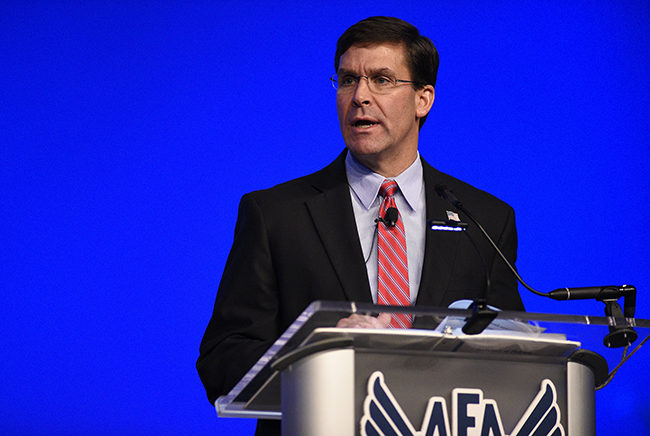
Defense Secretary Mark Esper delivers a Sept. 18, 2019, keynote address at the 2019 Air, Space & Cyber Conference in National Harbor, Md., near Washington, D.C. Staff photo by Mike Tsukamoto.
Defense Secretary Mark Esper said Sept. 18 he expects Congress will get on board with sweeping changes the Pentagon is planning in future budgets, even if it means lawmakers’ pet projects could be cut.
“I think Congress is very anxious for reform,” Esper said at AFA’s Air, Space & Cyber Conference. “I think there’s broad appreciation for the challenges we face. They are looking for leadership. And I think, for the most part, they will be supportive.”
The Defense Department is revamping its investments to better meet the needs of conflict with advanced adversaries that requires bigger boosts in long-range weaponry, cyber, electronic warfare, data-sharing networks, and more, while still keeping up with counterterrorism operations in the Middle East.
Acting Air Force Secretary Matt Donovan has hinted in recent weeks that service stalwarts could go away in upcoming fiscal years.
Esper said he ate breakfast Sept. 17 with the leadership of the House and Senate armed services committees, calling them “very receptive” to planned changes.
“Clearly, any program, project, activity, you name it, has some type of constituency out there,” he said. “If we come in clear-eyed with good arguments and a clear reason why this is the right thing to do, generally we will be supported by Congress.”
The Pentagon needs to use the current era of high defense spending levels to its advantage before it loses that edge, Esper said.
“The budgets are at the highest they may well be for some time,” he said. “If we do not capitalize on this moment, we will lose it and we could find ourselves well behind for many, many more years to come.”
In response to a question about the Senate Appropriations Committee’s recent remarks that the past few Air Force budgets have not adequately prepared it for the future, Esper said he couldn’t think of any USAF issues about which lawmakers have a particular gripe.
“There are always things that catch particular attention with regard to what a service may propose and what the Hill may think, or between what different parts of the Hill think,” he said. “I think the Air Force has a very well-developed modernization plan, which augurs well for the future and our ability to implement the [National Defense Strategy].”
In recent years, Congress and the Air Force have differed a range of issues from space launch strategies to E-8C replacement to F-15EX procurement.